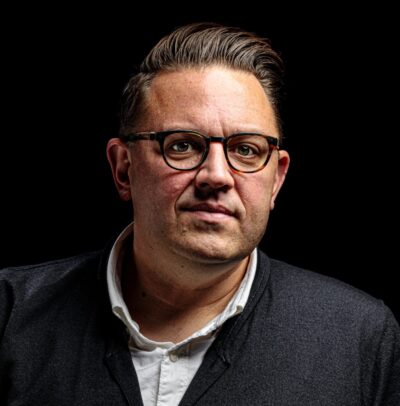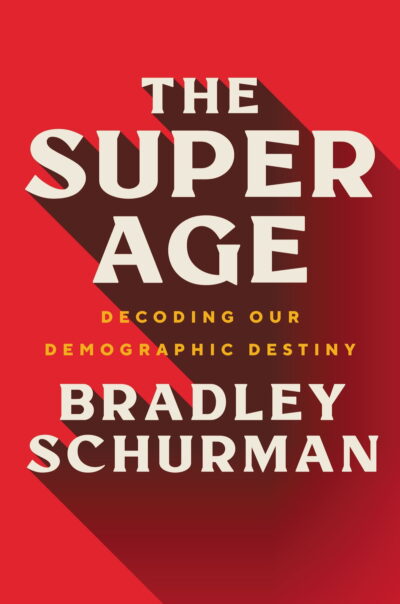According to Bradley Schurman, author of The Super Age: Decoding Our Demographic Destiny, humanity has embarked on an unprecedented demographic shift that will forever change the world as we know it.
The way we respond will determine how we address work, what growing older looks like, and answer questions about equity in a new protean age.
So what does this demographic earthquake mean for the LGBTQ+ community? In Part 2 of a two-part interview, Schurman talks about mental age, growing your own organs, and a “cure” for aging.
What are some hurdles older LGBTQ+ people have to overcome in the Super Age?
Never Miss a Beat
Subscribe to our newsletter to stay ahead of the latest LGBTQ+ political news and insights.
Ageism is one of the most commonly held biases that we have. Throughout all of history, the one joke we’re allowed to say all the time is about people’s age. It is just an accepted bias. And it’s a real problem for society at large because it holds us back in a way that’s really unacceptable bias. It creates a drag on our overall success.
People who tend to have a better outlook on their aging, their own mortality, and the way they live — guess what? They live longer. They live about seven and a half years longer than those that don’t. So, if we are, in our own community, we are barraging our brothers and sisters with these messages of, “You old queen,” it might feel like a joke. It might feel like part of what we do, but that can actually have the effect of eroding who we are as a person. Because we don’t know whether we’ve gotten old; our mental age always lags behind how we physically appear. And by those little quips here and there, we chip away at who a person is, or who a person believes they are.
Some are the folks constantly chasing youth, whether it be through plastic surgery, or spending all day at the gym. These are the folks that haven’t quite aligned the very natural processes of life, which includes getting older, with reality. And when you dissociate the two, it can be problematic for mental health at the end of the day.

But if older people feel like they are being ignored or cast out of the larger LGBTQ+ community, is it logical to turn to things like botox and the like? Billions are spent on these things every year.
Gay men have greater levels of body dissatisfaction, so it’s no surprise that some will turn to botox, facelifts, and other treatments to maintain their youthful appearance. This happens at all ages. Some men will even go so far as to take hormones to maintain their physique and sexual stamina.
In the book, you write about “making age work” in an aging society. Does that mean actually making older Americans work more?
To make age work means that we actually have to look back to the past for some degree of inspiration. I know people don’t like to hear this, but that may actually mean working for the majority of our years, not stopping at some predetermined dates of retirement set forth by the government or Social Security or Medicare. And actually extending working lives, well into our 60s, 70s, and in some cases, 80s or even 90s.
When we have all people working together, we actually have an economy that performs at higher rates. It’s certainly more resilient to change and to disruption. Also, our population growth is really slowing down here in the United States, so the more people that we have involved means the more our economy can continue to grow. You know, when you’re earning as an individual, you’re spending as a consumer. And that’s a good thing for the overall social welfare of a place.
It’s been government policy essentially for 100 years to say you should be retiring when you’re 65. Now, when people live on average to be 79, it doesn’t make a lot of sense to keep people out of work for 15-20 years, especially when those are good years that people could be contributing to the larger social and economic welfare of the nation.
In the U.S., this has consistently been the third rail of politics, touching Social Security, touching Medicare, but we’re coming up against some really stark dates from a public policy perspective. 2030 is the year that Medicare is no longer going to be solvent, and 2034 is the year that Social Security would no longer be solvent. 2034 actually may be moved up because of this cost-of-living increase for 2023 to 8.7% to match inflation. We actually may be depleting that sooner than later.
These programs don’t go away overnight. But without changes, guess what happens? Benefits start to decrease. So outside of increasing taxes or simply printing more money, the average American citizen will be spending more and getting less in retirement. So that means that people are going to be forced back to work, whether they like it or not because your options are kind of limited.
So what’s the good news?
We are in a full-scale labor force revolution. This is what really gets me excited. The thing about COVID is people think of it as this disruptive period. Well, it was a technological leap, too. I don’t know about you, but prior to COVID, I didn’t Zoom anyone.
No! Or Slack.
I hated it. Like — and I still don’t really love it — but it’s just normal now. So this great leap in technology, every time it happens, organizations flatten. Because of the tightening of the labor force, the worker is now more valuable. So now we’re going to start seeing better salaries. We’re going to see better benefits. The fact that employers cannot get people to come back to the office full-time, five days a week, signals to me that this is here to stay. Flexibility, first and foremost, is the one thing that everyone of every age group wants.
If you are able to get away from input and focus exclusively on output, who cares if a person spends four hours a week doing their job? If their output is higher, greater than somebody who’s putting in 40 hours, why are we counting the hours at all?

Many workplace cultures tend to be young, especially in tech companies. As people live longer and work longer, will that change in favor of older workers?
The tech industry tends to be the most ageist, which is not a terrible surprise.
Older workers are already protected from discrimination in the workplace by the Age Discrimination in Employment Act of 1967. However, ageism is notoriously difficult to prove.
But those same economic forces that I spoke about might be solving some of the workplace culture issues around age already. That tight labor market, which likely won’t abate for decades, is bringing older and disabled workers into the workplace at an astonishing rate.
You write that some researchers characterize aging as a disease. So what’s the cure?
Well, it depends on who you talk to. I do not buy into aging as a disease. Aging is a process, and that is the conventionally held wisdom right now. But there are a growing group of innovators, both funders and researchers, that are starting to treat aging as a disease. They’re doing this because they think it will shift their mindset of how they approach it. And if they solve for it as a disease, it will actually solve for these other diseases that we’re currently fighting right now: cancer, heart disease, diabetes, etc.
Human cells age. That’s what causes our aging. They die off. They slow down. There are all of these things that happen that contribute to our aging process. It’s not just lip and laugh lines, you know, it’s not just the sagging skin, thanks to gravity. We do actually have aging within ourselves. So we call this cellular senescence. And the real focus right now amongst researchers that are trying to turn around aging is to essentially cure cellular senescence, so cells can either regenerate at a faster rate, or they can remain young. Now they have been able to do this in mice. But you can do a hell of a lot of things with a mouse, right? Getting it to human trial, getting it to real significant interventions with human beings, that’s going to take a while.
But these are all incremental steps to potentially creating regenerative medicine, essentially. There’s a company that I mentioned in the book in Pittsburgh that was looking at using replication of your own cells to actually make replacement organs for you. If you have liver disease, for example, you take healthy liver cells out, you regrow a healthy liver, and when it’s time, you pop the old one out, and pop a new one in. Well, in theory, that could work. But also, in theory, there would be no rejection of that new liver because it would be your liver. So we’re getting into some really crazy thinking about what’s possible, but there’s nothing to say that it’s not.
If you think about the long arc of human history, what is possible in 50 years, I think popping out diseased organs for new ones seems completely reasonable. And that will be one of the contributing factors to extending life. Can we be immortal? There are some thought leaders out there that believe that we can. We don’t have a society, though, that is really set up for that reality.
And call me a traditionalist, but I like to think of life having a beginning and an end. And we work towards the life that we have. I think we’d all like to have extra good years. And I think that a lot of these scientists look through the lens of, “Imagine living your healthiest years for an extra 60 or 70 years.” I mean, I can, but what’s the limit then? Where do we really stop? And I don’t think anyone, including the ethicists that have looked at this, has really come up with a good answer at this point.
Peter Thiel is one of the people funding research into a “cure” for aging so he can live forever, for which he’s been ridiculed. The R&D you cite makes it sound plausible. Would it be better to invest that money in social programs and communities that bring people together and end health disparities?
In my book, I argue that investors like Thiel are doing revolutionary work. However, extending life or curing aging doesn’t solve for a lot of what ails us as a society. At some point, we’ll need to address the social and economic inequalities that pile up over time on historically marginalized populations, including women, people of color, and trans folks.
The other question is, who gets access to that extended life? Just people like Thiel?
The rich. The rich. The first round of anything is going to go to the rich. You know, the period that we’re living in right now, in terms of the longevity gap, the income gap, looks a lot more like the 1870s, 1890s Robber Baron period than most people would care to admit. Incredible income inequality actually shows up in longevity, too. So yeah, imagine these guys get access to treatments that allow them to extend their life by even as little as a quarter, or a third. That means they’re going to be able to earn even more, consolidate even more wealth, gaining even more control.
I mean, it does get very dystopian, very quickly.
Don't forget to share:














